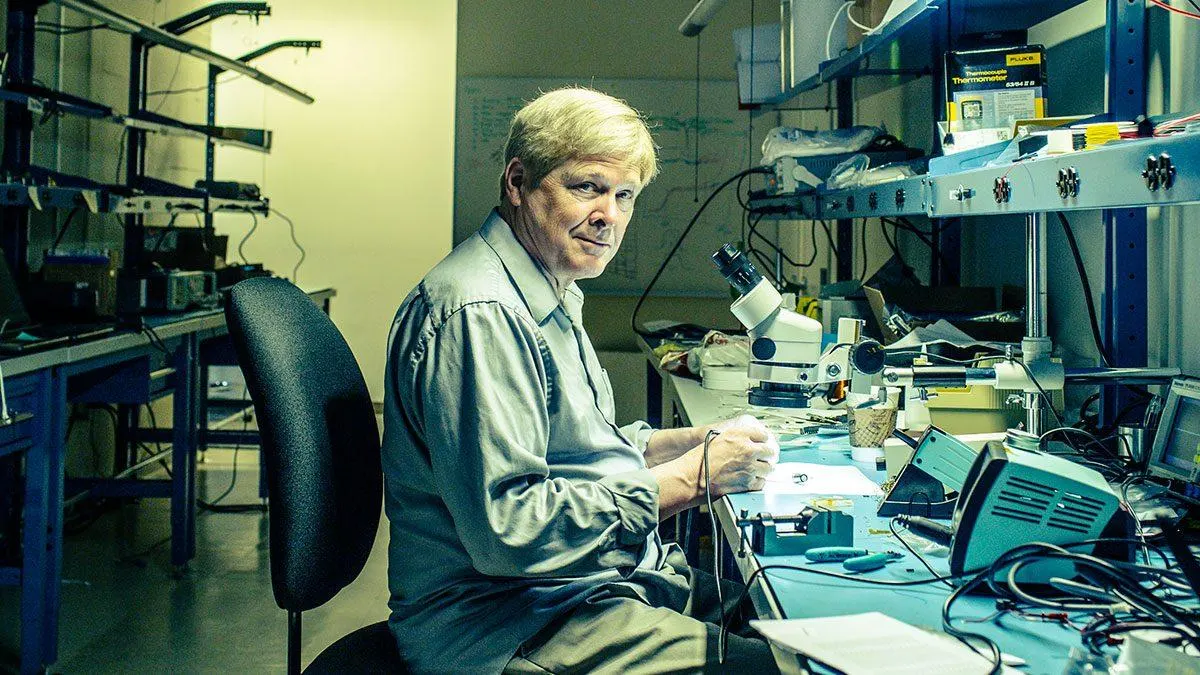Seconds after David Hall punches in a code, the electronic gate to his waterfront residence swings open. It's a large compound but not the kind you'd expect from a tech entrepreneur who is as responsible as anyone for ushering in the self-driving-car revolution. Hall, 66, is CEO of Velodyne, the leading maker of LiDAR sensors, the "eyes" that allow autonomous vehicles to see what's around them. He lives among a ramshackle collection of low-slung, shingled and metal structures built around a concrete plot on the Bay Area island town of Alameda, California. It's his favorite refuge, equal parts living quarters and workshop, where this inveterate tinkerer and serial inventor can work on his pet projects.
At one end there's a barn-size industrial shed where Hall and a team of engineers are perfecting one of his latest obsessions: a patented technology that keeps boats steady in the roughest waters. Marta, his wife and the head of business development at Velodyne, paints and sculpts in an art studio nestled inside another building. A couple of his Ford F-150 pickups are parked near a hulking crane that hauls boats in and out of the water. Hall's home itself is a houseboat, or rather a roomy prefab structure bolted onto a barge. From the living room you can hear small waves lapping at the shores of the sleepy canal that separates Alameda from Oakland. It's a world away from the bustle and glitz of Silicon Valley, where Velodyne has its headquarters, and that's the point. "I'm an engineer," the reclusive Hall says, referring to both profession and persona. "I'm basically an introvert, a nerd ahead of my time."
About a decade ahead of his time. In 2006, Hall patented one of his inventions--a multi-beam spinning LiDAR sensor--that put Velodyne, albeit almost accidentally, at the center of a revolution that's disrupting the auto and tech industries. Hall built the LiDAR sensor on a whim. Velodyne, which he had founded in 1983, was a successful business known for specialized audio equipment. But always itching to keep inventing, in the early aughts Hall became obsessed with a seemingly fantastical contest: a Defense Department-sponsored race for autonomous vehicles. It promised to be both fun and an excellent proving ground for his engineering chops. Over a couple of years, Hall refined a roof-mounted LiDAR (for "light distance and ranging") unit consisting of 64 lasers spun by a small electric motor; the device became a favorite of the race's winning teams. "It was revolutionary," says William "Red" Whittaker, a roboticist at Carnegie Mellon University and a father of the autonomous-vehicle movement.
The races, known as the DARPA Challenges, became the Big Bang event for self-driving cars, and Hall's LiDAR forever changed Velodyne from a modest family-run business into a hot commodity: a 34-year-old startup whose technology is remaking transportation and robotics. Today Velodyne is the top supplier of advanced automotive LiDAR and sells its sensors to virtually every auto and tech company that's building or testing autonomous vehicles. GM, Ford, Uber and China's Baidu are big buyers, and even Caterpillar uses Velodyne's tech for gargantuan robotic mining trucks. Google has been a major customer for years, though it's also making its own sensors. No company other than Velodyne produces comparable units in sufficient quantities to meet the growing demand.
Being the pick-and-shovel seller in the gold rush to a self-driving future is proving to be lucrative. Velodyne, which remains private, says revenue is expected to be about $200 million this year, and the company is profitable. It has set its sights on the billion-dollar sales mark, says Mike Jellen, Velodyne's president, though he won't say when it will reach that milestone. The company is ramping up production quickly, following a $150 million investment from Baidu and Ford last year. It was the first outside money into the company since Hall raised $200,000, mostly from his parents and his grandfather, to start the business. Velodyne won't disclose its valuation, but an estimate by Forbes, based on expected revenue, suggests a market value of about $2 billion. Hall is said to own more than 50%, giving him an estimated net worth of more than $1 billion. Jellen says an IPO is likely in "the 2018-19 time period."
But Hall is already thinking bigger. He wants to increase LiDAR production capacity from thousands of sensors a year to at least a million by next year. To do that, he's busy transforming Velodyne's new San Jose factory into a giant robot itself: a fully automated megafactory that speeds up production while reducing the cost of his complex devices to a level competitors can't match. Think of it as a scaled-down version of Elon Musk's "machine that makes the machine," as the Tesla founder has described his famed Gigafactory and next-generation plants. While an automated facility won't be making Teslas until at least 2019 or 2020, Hall wants his to be fully robotic by next year. If he pulls it off, Velodyne will be at the forefront of two seismic shifts in tech: cars that drive themselves and factories that need human technicians and programmers but no assembly workers. "Here's the goal," Hall says. "Can you run your factory with the lights off? If you can do that, then you can actually make this stuff in the United States."




.svg)